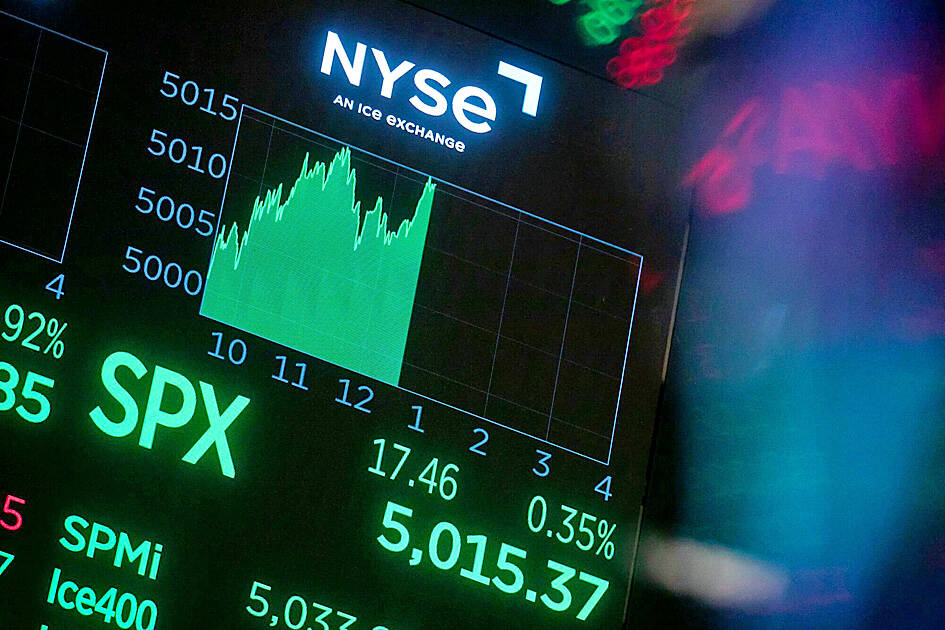The S&P 500 closed above 5,000 for the first time on Friday and the NASDAQ briefly traded above 16,000, with boosts from megacaps and chip stocks, including Nvidia Corp as investors bet on artificial intelligence (AI) technology and eyed strong earnings data.
Nvidia finished up 3.6 percent and hit a record high after Reuters reported it was building a new business unit focused on designing bespoke chips for cloud computing firms and others, including advanced AI processors.
This was after the Wall Street Journal reported on Thursday that OpenAI chief executive officer Sam Altman was in talks with investors to raise funds for a tech initiative intended to boost chip-building capacity for power AI, among other things.

Photo: Bloomberg
“The AI story so far has been all about building the infrastructure, the chips, the data centers,” said David Lefkowitz, head of US equities at UBS Global Wealth Management, adding that the report “at least underscores that there’s potentially a tremendous amount of demand going forward for AI infrastructure.”
While Lefkowitz said the S&P and NASDAQ’s round number milestones likely would not change investors’ calculations of the market’s risk and reward prospects, he said “it raises the profile of what’s happening in the market.”
Along with outperformance by the Philadelphia semiconductor index, which closed up 1.99 percent, technology-focused market heavyweights including Microsoft Corp, Amazon.com Inc and Alphabet Inc also contributed to index gains.
With results from about two-thirds of S&P 500 companies, LSEG data now show Wall Street estimates for fourth-quarter earnings growth of 9.0 percent versus expectations for 4.7 percent growth on Jan. 1, while 81 percent of companies are beating estimates, compared with a 76 percent average in the previous four reporting periods.
“Earnings have been strong so far, above expectations,” said Tim Ghriskey, senior portfolio strategist at Ingalls & Snyder in New York. “And there was news about additional growth opportunities for Nvidia specific to cloud computing, another growth area besides AI. Those are the big drivers.”
The Dow Jones Industrial Average fell 54.64 points, or 0.14 percent, to 38,671.69, the S&P 500 gained 28.70 points, or 0.57 percent, to 5,026.61 and the NASDAQ Composite gained 196.95 points, or 1.25 percent, to 15,990.66.
Positive earnings and the boost from AI optimism have helped the S&P 500 to notch 10 intraday record highs so far this year.
The NASDAQ closed just 0.4 percent below its 16,057.44 record closing high registered in November 2021.
For the week, all three indices registered their fifth straight weekly gain with the S&P adding 1.4 percent, the NASDAQ rising 2.3 percent and the Dow climbing 0.04 percent.
Earlier, data showed US monthly consumer prices rose less than initially estimated in December last year, but underlying inflation remained a tad warm — a mixed picture that clouded expectations on the timing of interest-rate cuts from the US Federal Reserve.
Strong economic data and hawkish comments from Fed policymakers in recent days have dashed hopes the central bank would start cutting interest rates next month.
Ghriskey points to Fed official predictions in the “dot-plot,” which still imply a rate cut this year.
“The market does have the Fed’s wind at its back. Seemingly we’ve reached the top of interest rates. The next move is going to down. We don’t know when that’s going to be. The Fed keeps throwing cold water on that idea but their votes with the dots say they’re going to be easing in the second half,” Ghriskey said.
Market participants are awaiting data on last month’s consumer prices next week for more clues on when the Fed will cut borrowing costs.

NEW IDENTITY: Known for its software, India has expanded into hardware, with its semiconductor industry growing from US$38bn in 2023 to US$45bn to US$50bn India on Saturday inaugurated its first semiconductor assembly and test facility, a milestone in the government’s push to reduce dependence on foreign chipmakers and stake a claim in a sector dominated by China. Indian Prime Minister Narendra Modi opened US firm Micron Technology Inc’s semiconductor assembly, test and packaging unit in his home state of Gujarat, hailing the “dawn of a new era” for India’s technology ambitions. “When young Indians look back in the future, they will see this decade as the turning point in our tech future,” Modi told the event, which was broadcast on his YouTube channel. The plant would convert

‘SEISMIC SHIFT’: The researcher forecast there would be about 1.1 billion mobile shipments this year, down from 1.26 billion the prior year and erasing years of gains The global smartphone market is expected to contract 12.9 percent this year due to the unprecedented memorychip shortage, marking “a crisis like no other,” researcher International Data Corp (IDC) said. The new forecast, a dramatic revision down from earlier estimates, gives the latest accounting of the ongoing memory crunch that is affecting every corner of the electronics industry. The demand for advanced memory to power artificial intelligence (AI) tasks has drained global supply until well into next year and jeopardizes the business model of many smartphone makers. IDC forecast about 1.1 billion mobile shipments this year, down from 1.26 billion the prior

People stand in a Pokemon store in Tokyo on Thursday. One of the world highest-grossing franchises is celebrated its 30th anniversary yesterday.

Zimbabwe’s ban on raw lithium exports is forcing Chinese miners to rethink their strategy, speeding up plans to process the metal locally instead of shipping it to China’s vast rechargeable battery industry. The country is Africa’s largest lithium producer and has one of the world’s largest reserves, according to the US Geological Survey (USGS). Zimbabwe already banned the export of lithium ore in 2022 and last year announced it would halt exports of lithium concentrates from January next year. However, on Wednesday it imposed the ban with immediate effect, leaving unclear what the lithium mining sector would do in the